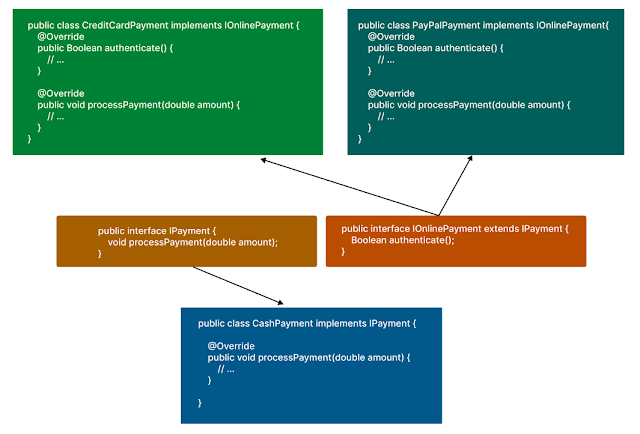The SOLID principles are a set of five design principles that enhances
object-oriented programming (OOP). This blog post reviews the
Liskov Substitution Principle(LSP) and shows how it can be applied
using Java examples.
SOLID Design Principle is made up of five different principles:
- S: Single Responsibility Principle(SRP)
- O: Open-Closed Principle(OCP)
- L: Liskov Substitution Principle(LSP)
- I: Interface Segregation Principle(ISP)
- D: Dependency Inversion Principle DIP)
Liskov Substitution Principle
The Liskov Substitution Principle (LSP) emphasizes that objects from a
superclass can be replaced with objects from a subclass without affecting the
program's correctness. This principle ensures that derived classes follow the
contract established by their base classes, thereby improving code reliability
and preventing unexpected behavior in polymorphic scenarios.
This is the third principle of the SOLID design principle group. It tells us:
We can replace subclass or child class objects with base class objects whenever necessary. This substitution should not change the program's desired properties.
Let us demonstrate this with a simple example. Assume we have the class
Bird, which has two methods: eat() and fly(). Class
Eagle has now inherited the Bird class. The Eagle class now owns
the eat() and fly() methods. So we can use the object of the
Bird class instead of the object of the Eagle class.
This will not disrupt the existing functionalities.
It sounds simple, and it is. But there's a catch here.
This principle applies to classes that exhibit the same behavior. We
assume that the Bird and Eagle classes behave similarly. At the same time,
the subclass's overridden methods should behave the same way as the
superclass's methods.
Based on this assumption, we can use the Bird object rather than the
Eagle
object.
But what happens if the parent and child classes do not behave
similarly?
What happens if the overridden methods of the subclass do not behave like the
superclass's methods. How can we apply the
Liskov Substitution Principle in those cases?
Let us consider another example. We will explore this principle with a
Java-based Payment Processing System.
Example without LSP
Assume an e-commerce platform has different types of payment methods.
Customers can pay with Credit cards, Debit cards, PayPal, or Cash.
The payment classes override the processPayment(...) method. This
method will contain logic for processing payments. We may need to consume
third-party APIs to settle Credit card or PayPal payments.
But in the case of cash payments, there is no need to process. We can simply
accept the cash. As a result, the behavior of
precessPayment(...) differs when cash payments are made.
The behavior of the processPayment(...) method is not the
same in all the subclasses. So this violates the Liskov Substitution
Principle.
Example with LSP
To implement the Liskov Substitution Principle, we created two interfaces:
IPayment and IOnlinePayment.
IPayment is the interface for all payment types.
IOnlinePayment is the interface for all kinds of
online payments.
CreditCardPayment and PayPalPayment have implemented the
IOnlinePayment
interface.
We've overridden the authenticate() and processPayment() methods
in the classes.
Here is our class on cash payments. This class only implements the
IPayment
interface.
It overrides the processPayment() method. Because authentication is not
required here, we have not implemented the IOnlinePayment interface.
Every class correctly extends Payment's behavior while adhering to
expectations.
Happy coding!!! 😊





No comments:
Post a Comment